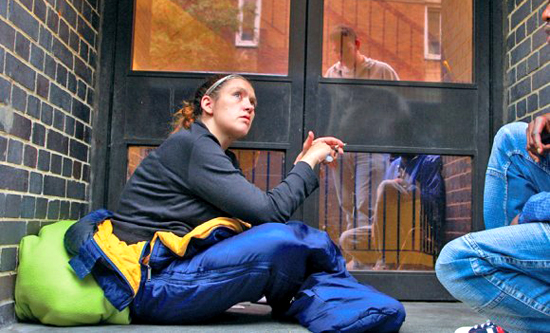
New statistics lay bare the shocking reality of class society in Britain. While the Chief Executive of collapsed travel company Thomas Cook received £8.9m in bonuses since in 2014 and lived in a £2m Surrey mansion, more than eight million people in Britain live in unsuitable housing – 3.6 million in overcrowded housing, 2.5 million in unaffordable housing, 1.4 million in poor or substandard conditions (Daily Mail and The Guardian, 23 September).
According to the Institute for Fiscal Studies (IFS) annual report on inequality and poverty in Britain, the poorest fifth of households saw their incomes decline by 1.6% in 2017/18, as working-age benefits were reduced. Meanwhile, the incomes of the middle fifth of households stagnated due to rising inflation, and the top fifth of households saw their incomes increase (+0.8%).
After the 2007-8 financial crisis, median income dropped sharply before gradually beginning to recover. In 2017/18 this apparent progress (distorted by high income growth at the top) ground to a halt. Employee earnings fell in real terms as the price of goods increased faster than wages.
The IFS has announced the launch of a review to be led by economist Angus Deaton, a five-year study into inequality. Its initial findings are stark:
- The share of national income going to the top 1% of households has nearly tripled from 3% to 8% in the last four decades.
- Chief executive pay in the FTSE 100 in 2017 was 145 times higher than that of the average worker, up from 47 times in 1998.
- While the amount of wealth (property, investments, pensions etc) in Britain rose by 15% in the two years to 2016, to a record £12.8 trillion, the top 10% own half of this. The wealth of the poorest fifth, like their income, has declined.
- The lowest earning households earn little more after inflation than they did in the mid-1990s.
- Eight out of 10 companies pay men more than women.
- Pakistani and Bangladeshi workers received 20.1% less than white workers.
At the launch of his review, Deaton described the challenge that capitalism faces: ‘Today’s inequalities are signs that democratic capitalism is under threat…I’m a great believer in what capitalism has done…but we need to think about repairs for democratic capitalism.’
Deaton gives voice to the growing anxiety of liberals and social democratic reformists: unless inequality can be fixed, the bourgeois democracy they have long administered could be demolished. They rarely worried about inequality before. Now it threatens their status.
‘For me, I think that people getting rich is a good thing,’ Deaton concluded, ‘especially when it brings prosperity to others. But the other kind of getting rich – what you might call taking rather than making, rent-seeking rather than creating…taking the “free” out of “free markets”, is making a mockery of democracy. In that world, inequality and misery are intimate companions’.
The truth is, great wealth and great misery are always intimate companions under capitalism; capitalist society has always needed barbaric, unimaginable violence to defend the rich and powerful against the poor that they exploit. And anxious reformists will always wish to turn back the clock to what they imagined was a more ‘democratic’ capitalism. They are incapable of grasping that the only way forward is socialism.
Will Harney
Fight Racism! Fight Imperialism! No 272, October/November 2019




